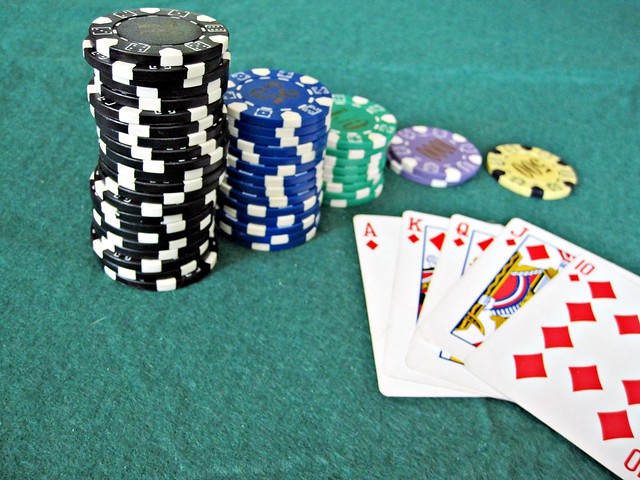
After listening to James Earnest and Jason Morningstar talk about randomness in game design, I got to thinking about a peculiar mechanic. Imagine a wagering game in which the more you wagered, the less likely the odds of winning, but the greater the payout if you do win. You control (or at least partly control) the risk, though.
Supply
Each player has a supply of cards that are identical except for their suit. Each player has her own suit. Cards are numbered in ascending numerical rank. Suits are never shuffled or mixed, so one player is always Hearts, another is Clubs, and so on. Each card also lists a bonus effect.
The Wager
At the start of the turn, each player places face-down in front of them up to three cards from their supply. This is a player's wager. When all players have wagered their cards, reveal them.
The Prestige
Shuffle the remaining cards into a single deck. Draw three cards from the deck and reveal them to all players. This is the prestige.
The Score
If any of the cards from the prestige are your suit, you earn points equal to the rank of all your wagered cards.
The Effects
Each wagered card has a special effect. Players take turns resolving any special effects on wagered cards. Only one effect may be resolved per turn until all effects have been resolved. Then players discard all their wagered cards.
End of Round
Sort out all players cards from the deck and return them to their owners. Wagered cards remain discarded, however. Thus a new round begins with each players' supply of cards diminished by whatever wagers they've made in past rounds.
End of Game
The game ends when any player has only two or fewer cards left in their set. The players score bonus points for treasures (see below) and the player with the most points wins.
----
So that's the idea. I'd like to brainstorm various effects and figuring out how to wrap these into some kind of theme.
In particular, I'd be cautious about any royal, fantasy or pirate themes so as to avoid comparisons to Love Letter, Chronicle, or Libertalia. Granted, the gameplay is different from all these games, but they're also all ranked-character-cards-with-effects.
Let's get brainstorming!
A List of Conditions
- If this is lower/higher rank than any card in the prestige.
- If this matches the rank/suit of a card in the prestige.
- If this does *not* match the rank/suit of a card in the prestige.
- If you're the only player to wager this rank.
- If another player wagered this rank.
- If you did/did not score points from the prestige.
A List of Effects
- Earn X bonus points, and your opponents earn Y bonus points.
- Keep this card to face-up to your side as a Treasure. (Earn more bonus points at endgame.)
- Earn X bonus points per opponent's Treasure.
- All players must discard one Treasure.
- You may keep one of your unresolved wagered card as Treasure. Do not resolve its effect.
- Draw a discarded card back into your supply. (Don't show it to the other players.)
- The player with the lowest ranking wager must discard a card at random from his set.
- Resolve another player's wagered effect as if this were that card.
- Resolve another of *your* wagered effects as if this were that card.
The game could be just fine without conditions. I worry about analysis paralysis here. These conditions do give further incentive to control the odds of the prestige in various ways: "If I wager Card A, I shouldn't wager Card B, because that will decrease the chances of Card A being resolved."
I'm not sure if that's as interesting or fun as simply saying: "I resolve Card A, which gives me treasure."
No comments:
Post a Comment